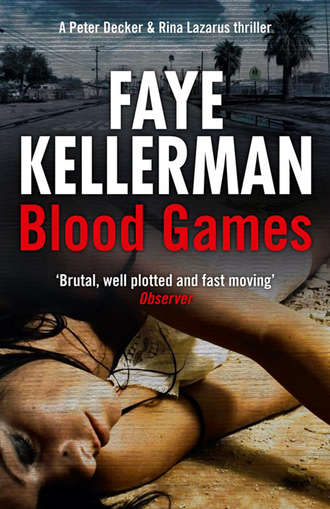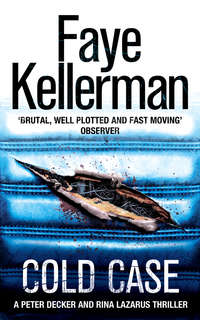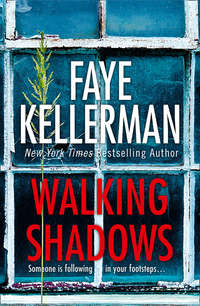
Полная версия
Blood Games
“I put a call into her secretary. Doctor was with a patient. Her lunch hour is from twelve-thirty to two. I’ll just pop in and try to catch her then. Maybe Gregory Hesse was her patient. You know teenagers and acne. Could be he lifted it from her desk.”
“The gun was stolen six years ago,” Marge said. “Gregory would have been eight or nine.”
“Right,” Oliver said. “So it probably passed through a few hands since then.”
“Was just her gun stolen or was it part of a larger burglary?”
“I don’t know. I just plugged in the serial number and there it was.”
“Where did the theft take place?”
“From her office,” Oliver said.
“Her office. Interesting.” Decker thought a moment. “Maybe she had problems with previous drug break-ins and felt she needed protection.”
“When I speak to her, I’ll ask her about it.”
“Okay. Also find out who knew about the gun and who had access to it.”
“Got it.” He stood up and looked at Marge. “Want to come with me?”
“I’ll go with you if you come with me to Bell and Wakefield. The Loo wants some phone numbers. Those kinds of things are easier to get if we show up in person.”
Decker said, “And while you’re at it, get Gregory Hesse’s class schedule. At some later date, we may want to talk to his teachers.”
“Sure, I’ll come with you,” Oliver said to Marge. He regarded Decker. “Is this Gregory Hess thing like a full-fledged investigation? I mean all signs point to the kid killing himself. Case closed.”
“A fifteen-year-old boy shoots himself with a mouse gun stolen six years ago from a doctor’s office. I’m a little curious. For now, let’s say case still open.”
THE BEEP FROM his cell distracted Gabe’s concentration … which was okay with him because he really wasn’t playing very well.
Some days you hit it, some days you didn’t.
He’d forgotten to turn off his phone. Why he kept it was still a mystery to him. Not many people called nowadays: the Deckers, his piano teacher who was usually switching times on him, and his father engaging him in thirty-second conversations. For the amount of minutes Gabe used per month, it didn’t even pay to keep the line going except that it was more expensive to cancel the service than to keep it current.
It was a text from a local number that Gabe didn’t recognize: i’m coming with u on sunday.
It was from the Persian girl. Yasmine. The smile that spread across his face was involuntary. He had been thinking about her the last couple of days. Not on-purpose thinking. That’s the kind of thinking when you longed to keep the image fresh in your brain—like the last time he saw his mother. It wasn’t like that … just that Yasmine had popped into his head from time to time.
His thumbs pecked across the keyboard of his phone.
g8. where do u want to meet?
She texted him back an address of where to meet her with the cab.
it’s 3 blocks from my house. what time?
The show started at three. A taxi wouldn’t take nearly as long as a bus, but he still wanted to allow a little breathing room because he was a stickler on punctuality.
is 1 ok?
a little early for me to get out. how about 2?
cutting it too close. 1:30 max.
ok.
A pause.
B there 1:30.
He wrote, looking 4ward. Bye.
bye.
He put down the phone. Then it beeped again.
Thx.
He smiled again. ur welcome.
This time he turned off the phone and went back to his piano. He stowed the Mozart piano sonata no. 11 in A major and instead chose Chopin—the polonaise in C-sharp minor, op. 26, no. 1, first movement—allegro appassionato.
His mood of the moment was very appassionato.
THE BANNERS HANGING across the two-story buildings announced that Bell and Wakefield was currently celebrating thirty years of excellence. It was built when Marge had just come on as a rookie detective in the Foothill Division with Decker. The school’s architecture had held up well because the style was classical: California mission with large leaded-glass windows, wood-trimmed doors, stucco walls, and red tiled roofs. The campus was set on acres of rolling lawns shaded by sycamores, eucalyptus, and California oak. Facilities included a library, a computer lab, and a faculty building along with a football field, a bank of tennis and basketball courts, plus an outdoor swimming pool. Cars in the student and guest parking included subcompacts, compacts, and lots of four-wheel drives from Ravs to Range Rovers. Faculty had their own dedicated lot.
Marge and Oliver arrived on campus at 11:30. The Administrative Building was the largest building on campus in size as well as height, and it hummed with activity. The walls were festooned with material—term papers that had received A+ grades, high-quality artwork, news articles, colored flyers, announcements, photographs, and one giant overstuffed complaint box. The Admission Offices took up the first floor. The largest of the rooms resembled a bank with a line of students standing on one side of the counter and the school employees sitting on the other side. Behind them was an open space of desks with computers. Lots of people were tapping on keyboards.
The two detectives waited in line and when they got up to the counter, Marge flashed her badge, asking a startled woman if she could speak to someone from the administration on a personal matter. Five minutes later, they were escorted into the office of the boys’ vice principal. Dr. Martin Punsche, they were told, would be with them shortly. His office was small—a desk with a computer, four chairs, a bookshelf, and not much else. It did have a window with a view of the lawns.
Punsche appeared with an outstretched hand, welcoming them to Bell and Wakefield. He was a man in his fifties, broad shouldered and bald with a broken nose. Put a white shirt on his body and a whistle around his neck and he could have been the football coach. Instead he wore a blue shirt, gold tie, and gray slacks.
“Maggie told me it was a personal matter,” Punsche said. “I hope it’s not trouble. The school has been going through some difficult times. Have a seat.”
The detectives sat down. “Difficult times?” Marge asked.
“You must know that one of our students met a terrible fate a couple of days ago.”
“Gregory Hesse,” Oliver said. “That’s actually why we’re here.”
“I figured as much. Terrible, terrible thing. We’ve already held a school assembly about it. We’ve been encouraging our students to talk about it. I’ve also scheduled several psychologists and doctors to come and talk about suicide prevention. Our student presidents, Stance O’Brien and Cameron Cole, have set up a student hotline. Around a dozen of our seniors have volunteered to meet with the freshmen for an informal rap session during lunch. I’m so proud of how our students have mobilized.”
Marge stared at him. The poor kid had just blown his head off, and the dude was a booster for school spirit. Did he ever turn it off?
Punsche placed his hands atop his desk. “So … how can I help you?”
Oliver straightened his tie. “We’re still tying up a few loose ends with the case.”
“What kind of loose ends?”
“Things that don’t add up just yet.”
Marge said, “They may add up later, but right now we’re investigating a few things at Wendy Hesse’s behest.”
Oliver shrugged. “For starters, we need a few phone numbers.”
“You mean phone numbers of our students?” When Marge nodded, Punsche said, “You know I can’t just give out numbers without asking the parents.”
“We’re interested in Joey Reinhart, Gregory Hesse’s best friend,” Marge said. “We can get the number from Wendy Hesse—she’s the one who told us about Joey—but the lieutenant didn’t want to bother her. You can understand that.”
Punsche stroked his hairless chin. “Why did Wendy Hesse contact you?”
“Like my partner said, some things are not quite adding up. We take all crime seriously, and suicide is a crime.”
“It’s a crime in only the most technical sense.”
“That’s the LAPD,” Oliver said. “We’re very technical.”
Marge said, “We also found out some interesting things about another friend of Gregory’s. A boy named Kevin Stanger. He transferred from Bell and Wakefield around six months ago at the beginning of the sophomore year. I’m assuming that you’d still have his address and phone number.”
“Kevin Stanger.” Again, he stroked his chin. “I’m sorry. I can’t put a face to the name.”
Marge said, “Maybe you don’t know him, so I’ll clue you in to what I heard. Kevin Stanger transferred because he was bullied.”
Punsche shook his head. “If he were bullied here, I would have heard about it.”
“You didn’t hear about it,” Oliver said. “But that doesn’t mean it didn’t happen.”
“Look, I don’t know everything, but I do know a lot. If we knew that a child was being bullied, we would deal with the situation quickly and efficiently. We have no patience for that kind of nonsense.”
“So bullying doesn’t go on here?”
“There are cliques. Although the school excels in academics, sports, and theater arts, it’s still a high school filled with teenagers. There are popular kids and I’m sure they’re not the most gracious to everyone. There are bound to be kids who feel like outcasts. But that’s a far cry from bullying.”
Marge tried a different approach. “I’m sure you’ve got an excellent feel for your students. Right now, all we’re looking for is a couple of phone numbers. Heck, all we want is to bring a little, bitty piece of comfort to Wendy by nailing down a few details. Help us with that.”
Punsche said, “I suppose I can get you the phone numbers. Kevin Stanger may take a few minutes because he’s not current and is no longer in the computer.”
“That’s okay,” Oliver said. “We can wait.”
“If you can get us Gregory’s class schedule, that would be helpful,” Marge added.
“Surely you didn’t come all this way just to get a few numbers and a class schedule,” Punsche said.
Marge said, “Actually we did. We were in the neighborhood anyway. But while we’re here, if there’s anything else you can tell us about Gregory that might be helpful, please feel free to talk.”
Oliver said, “Things like what he did, who’d he hang out with, what clubs he was in … what made him tick.”
“This is embarrassing but I’ll say it anyway.” Punsche’s cheeks pinkened. “I didn’t really know the boy. I never had any cause to become … involved with him. Usually, I deal with problems and problem boys. As far as I knew, Gregory fit in nicely.”
“Is that opinion based on something concrete or the absence of problems?”
The VP hedged. “I’m sure I would have gotten to know him better. But when all this went down, I was … unaware that he was troubled.”
Oliver said, “Since you didn’t know him well, maybe you can direct us to someone who did.”
Punsche seemed bothered. “Try some of his teachers. I’ll get you that class schedule, and then if I were you, I’d just go down the list.”
CHAPTER FIVE
I’D SHOOT MYSELF if I had to be in high school for nine hours a day, five days a week.” Oliver was looking over the class schedule. “Whatever happened to creative boredom?”
“That’s why Hollywood is mostly remakes of old stuff.” Marge was behind the wheel. They had finished up with Bell and Wakefield by one and were headed toward Dr. Olivia Garden’s dermatology practice in Sylmar. “No ingenuity. And I’m not even talking redoing the classics. It’s like sixties sitcoms or Charlie’s Angels. Lowbrow stuff.”
“There I disagree.” Oliver looked wistful. “Charlie’s Angels had redeeming virtues.”
Marge smiled. “I told Lee Wang to take the Ruger to ballistics and see if it’s been used in other crimes.”
“How do you think Hesse got hold of it?”
“Beats me.” Marge’s cell rang. “Can you get that for me?”
“You could use Bluetooth.”
“So you could hear all my personal stuff? No, thank you.”
“Picky, picky.” Oliver rooted through her purse and picked it up. “Detective Oliver.”
The voice on the other side was female and hesitant. “I’m returning a call from Sergeant Dunn.”
“She’s driving right now. Who am I talking to?”
“This is Nora Stanger.”
“Ah, thank you for calling back, Mrs. Stanger. I’m Sergeant Dunn’s partner, Detective Scott Oliver. We’re going over some details of Gregory Hesse’s tragic suicide and wondered if we could talk to you. I understand your son, Kevin, was a friend of his?”
“The boys hadn’t seen each other in a while.”
“Yes, I know Kevin transferred out of Bell and Wakefield. I was hoping that your experience could shed some light on what happened. Gregory’s mother, Wendy Hesse, is suffering, and any answers we could give her would be helpful.”
The voice over the line was baleful. “That poor woman.”
“She’s really in the dark about what happened. And we don’t know a lot about Bell and Wakefield. The administration, of course, is protective of the school. Maybe you can fill us in. My partner and I have an open schedule. What would work for you?”
“I … I have to talk to Kevin. At this age, I can’t make decisions for him.”
“You have Sergeant Dunn’s number. Let me give you mine.” Oliver rattled off some digits. “Le me know when it’s convenient for you to meet us. And thanks for calling back.”
“You’re welcome.” Nora cut the line.
Oliver stowed Marge’s phone back in her purse. “She has to ask Kevin.”
Marge nodded.
“What did you think about Punsche?”
“Glad-hander and a bullshit artist,” Marge said. “But I believe him when he said that he wasn’t aware about Kevin Stanger’s problems.”
“He must have known that the kid transferred.”
“Maybe he knew about the transfer, but maybe not why. If the kid was bullied, I do think the school would have reacted.”
“Maybe.” Oliver thought a moment. “I wonder how much Nora Stanger knows about her son’s problems.”
“Enough to pull him out of the school,” Marge said. “Kevin’s the one we really want to talk to. He’s the one who can name names.”
DR. OLIVIA GARDEN, M.D., and Dr. Gary Pellman, M.D., ASDP, was a medical corporation. The office was in a one-story strip mall that shared a parking lot with a doughnut shop, a sandwich shop, and a Laundromat. Marge found street parking and fed the meters.
Once inside the office, Oliver knocked on the sliding glass partition. The woman behind the door was in her sixties, with short gray hair, a round face, and brown eyes. She wore no makeup but her skin was baby smooth—a walking advertisement for the practice. She had on a white coat, and a stethoscope dangled from her neck.
“The office is officially closed until two, but maybe I can help you.”
“We’re looking for Dr. Garden,” Marge said.
“You found her.” After Marge presented her badge, the doctor said, “Come around the side.” She opened the door. “Let’s go into my office. I’m just finishing lunch.”
“We’re sorry to interrupt,” Marge said.
“No problem.” She ushered them inside her personal domain. “Pull up a chair.” She sat behind her desk and took a bite out of a half sandwich. “So what’s this about?”
Oliver said, “About six years ago, you reported your gun stolen—a .380 Ruger.”
“You found it?”
“Yes, we did. It was recently used in the suicide of a fifteen-year-old—”
Olivia Garden gasped. “The one in the papers?”
“Yes. His name was Gregory Hesse. Did you happen to know him or his family?”
“No.” The doctor shook her head. “Oh my, my, my. How’d that poor boy get my gun?”
“That’s why we’re here,” Oliver said. “We have a couple of questions about the burglary.”
Marge pulled out a notebook. “We understand that the gun was taken from your office.”
“Yes, it was—a long time ago….”
“Was it only the gun taken or was that theft part of a larger burglary?”
“No, I believe it was only the gun.”
Oliver said, “Why did you have a gun in your office?”
A pause. The doctor said, “As I recall, there had been a rash of medical office break-ins in the area. The police never arrested anyone, but we held some neighborhood watch meetings and we all thought that it was some hype looking for drugs. Anyway, the tipping point for me was when a nurse who was working late was knocked over the head and had to go to the hospital. She turned out to be all right, but I was shaken up. My husband suggested I get a gun because I often work late.”
Oliver said, “So how long did you have the gun before it was stolen?”
“Not too long at all. I’d like to say around six months.”
“Did you get another gun?”
“I did not.” She took another bite of her sandwich. “After the theft, I felt that I didn’t want to contribute to the vast arsenal of black market weapons. I figured I was better off with a baseball bat. But luckily, it never came to anything. The burglaries stopped, and we figured the thief went on to greener pastures.”
“Did you realize right away that your gun had been stolen?” Marge asked.
“Good question. I kept it in a lockbox in my bottom drawer and I didn’t open up the box very often. It could have been stolen months before I discovered it.”
“Who knew you had a gun?” Oliver asked.
“No one besides my family. I never did tell my employees. I didn’t want to frighten anyone.”
“What about your children?”
“My sons are thirty-nine and forty-four. They’ve been out of the house for years. I certainly wouldn’t have told them about a gun. They would have worried about me. We’re not a gun family. It’s just at that time, I felt vulnerable.”
Oliver said, “Is it possible that one of your employees might have stolen it?” When she looked skeptical, he said, “Did you have any problems with someone who worked for you?”
She shook her head no. “I’ve had the same people for years. I think the last time I actually had to let go of someone was a decade ago. It wasn’t someone I knew. It was a stranger. I’m sure of it.”
Marge said, “I would say that was probably true if the gun had been part of a larger burglary. But how would it be that a thief found the weapon, but took nothing else?”
She didn’t answer and finished her sandwich. “What are you going to do with the gun?”
“Right now, it’s regarded as evidence.”
“You can keep it. I don’t want it anymore, especially after what you just told me.” She munched a carrot and looked at the clock. “I have to make a few phone calls before the office reopens. I hope you don’t mind.”
The two detectives stood up. Marge said, “Thanks for making the time. I must say, Dr. Garden, that your skin is beautiful. Do you have a special secret?”
“I won’t tell you my guarded secrets.” The woman smiled broadly. “But I’ll give you a hint to one of my secret weapons. It starts with B and ends with X. And if you can’t figure that out, you’re probably a Luddite.”
“SHE SAID SHE bought the gun for protection and six months later found it had been stolen,” Marge said. She and Oliver were in Decker’s office. It was around four in the afternoon. “She’s positive that no one else knew about the weapon other than her family.”
Oliver asked, “Did Lee hear back from ballistics?”
“If he has, he hasn’t called me with anything,” Decker answered.
“I can’t believe a stolen gun would have been floating around for six years without it being used for something criminal.”
Marge said, “The bigger question is, how did it get into Gregory Hesse’s hands?”
“And we’re no closer to a solution on that one. Mrs. Stanger hasn’t called back. I don’t know if she will. She seemed reluctant to talk.” Oliver regarded Decker. “Maybe if someone with more authority called, she’d relent.”
“How close were her son and Gregory?”
“Don’t know,” Marge said.
“But we do know that Gregory and Joey Reinhart were best friends. Maybe we concentrate on him.”
Marge said, “We left messages on the house machine and Joey’s cell. No call back.”
“When did you leave a message?”
“About two hours ago.”
“Give me his address.” Decker stood up. “It’ll stop by on my way home.”
DECKER ALWAYS HAD reservations about working on Friday night. And with this case, there was no immediate urgency—just a desire to help out a distraught woman. There was no real justification to be parked across the street from Joey Reinhart’s house when he should be home inaugurating the Sabbath. He rationalized it by telling himself that it was only six in the evening. He had promised Rina that he’d be no later than seven. He was just about to get out of the car when a scrawny teen came out of the house, jiggling car keys. He was hunched over and wore a windbreaker and jeans. He opened the driver’s door of a blue Ford Escort, got inside, and began to inch out of the driveway.
One of the kid’s taillights was out.
Perfect.
Decker turned on the ignition and followed him several blocks until the kid turned onto the main street. A minute later, Decker pulled out the red light and stuck it onto the roof of his car. The kid dutifully pulled curbside. When Decker approached the Escort, the kid rolled down the window, regarding Decker with fear.
“May I take a look at your license?”
The boy’s hands were shaking as he handed over his wallet. “What did I do?”
Decker took the license and gave him back the wallet.
Joey Harmon Reinhart. Five eleven, one fifty (when pigs fly, Decker thought), brown eyes, brown hair. His date of birth put him at sixteen and three months. Decker gave the kid back his license and motioned him out of the car and onto the sidewalk.
The kid complied. He was so nervous, his knees almost buckled.
“Your left taillight is out.”
“I didn’t know. I’ll get it fixed right away.”
Decker studied him. “You know, Joey, if someone pulls you over in an unmarked car, don’t get out. Stay inside your car with the doors locked and ask for ID. I don’t care how belligerent the guy on the other side of the window gets. Any real officer won’t take offense. Getting out before you know what’s going on is dumb.”
The poor kid just nodded.
Decker took out his wallet and showed him his badge and registration. “Even this could be fake. So the next step is to use your cell and call my name into LAPD. Because I could be anyone, right?”
The kid nodded like a bobblehead.
“Who does it say I am?”
The kid read the registration. “Lieutenant Peter Decker.”
“So then you call up LAPD and get my badge number.”
“You want me to do that now?”
Decker smiled. “Don’t bother. I am a police lieutenant.” He regarded the license. “Where are you going?”
“Just hanging out with some of my friends.”
Decker gave him back the license. “I’ll let you go with a warning, but get that fixed.”
“Yes, sir. Right away. I mean, first thing tomorrow. I think all the garages are closed—”
“Just get it fixed.” Decker took in the kid’s fearful eyes. “You know, Joey, I recognize your name.”
“You do?”
“Yeah, you were a friend of Gregory Hesse’s, right?” The boy didn’t answer. “One of my detectives left a message on your cell about Gregory Hesse. You haven’t called him back. Neither has your mom or dad. Any reason for that?”
The kid started shaking in earnest. Even in the dark, Decker could see the ashen complexion. The last thing he wanted was for some teenager to whine to his parents about police brutality.
“Don’t worry about it,” Decker said. “I’ll call your parents again.”
“No, no, don’t do that!” the boy implored. “I was gonna call, but it was already like Friday night and I figured no one was in.”
“The police do work on the weekends.”
“Yeah, of course. I know. That’s stupid.” He hit his head. “Greg was my best bud. We can talk about it. Not now. It’s not a good time, I mean place. I mean, place or time.”









